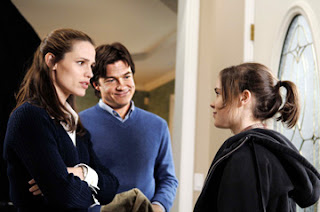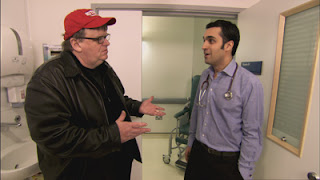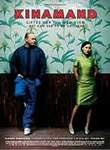
Director: Jason Reitman
Despite the
Napoleon Dynamite marketing strategy of orange t-shirts with a slogan to rival
Dynamite’s catch-phrase "Vote for Pedro" and an online club to create a
Junoverse of fans who’ve seen the film numerous times,
Juno is not only superior to
Napoleon but also from the moment it begins, it makes one think it’s a more earnest and lovely version of
Ghost World.
Co-produced by
Ghost World producer John Malkovich, director Jason Reitman (son of Ivan) returns hot off his filmmaking debut
Thank You for Smoking with another gem sure to be a cult hit among independent film fans. The film which has been making its way from ecstatic critical receptions and festivals around the globe has just last week been nominated for a few Independent Spirit Awards including Best Film and Actress for its triumphant turn by up and coming star Ellen Page.
Likable Page whom audiences may remember from
X-Men 3 and
Hard Candy has made an increasingly positive impression on me since I first saw her work in Canadian films chosen for the Film Movement series such as
Wilby Wonderful and
Marion Bridge years ago.
The twenty year old Page is currently the toast of the awards season with rumors of a possible Oscar nomination and from the opening moments of
Juno, we’re instinctively on her side as the precocious, unique and unforgettable sixteen year old who is shocked to discover she is pregnant from a spontaneous and none-too-romantic coupling with her best friend Paulie Bleeker (Michael Cera) that seems to have been initiated out of sheer boredom.
Although she uses the hamburger phone in her bedroom “to procure a hasty abortion,” Juno changes her mind once in the creepy clinic and decides to take an unusual route of finding a couple advertising for adoptable spawn in the
Penny Saver.
It’s adoption at first sight when Juno lays eyes on the beautiful, wealthy St. Cloud, Minnesota couple Vanessa and Mark Loring (played by Jennifer Garner and Jason Bateman respectively) and after a delightfully awkward encounter that still felt far more real than anything in the
Meet the Parents films, Juno decides to keep the baby in the oven until it gets cute enough to be handed over once it’s born only to realize that parental appearances can be deceiving.
A film about teenage pregnancy shouldn’t be this winningly heartfelt or funny but we’ve been treated to an impeccable and refreshing script by first time writer Diablo Cody that hooks us from the start. Cody, a Minnesota native herself, has a knack for not only the atmosphere of her home state which as a fellow native Minnesotan I can say rang true which is used to great effect in Reitman’s film but is also a distinctive writer that made me recall the delightfully original scripts for
Bottle Rocket and
Swingers in announcing that a new writer has arrived.
Cody, a former stripper made famous from her tell-all blog, explained to
Filmmaker Magazine that writing in Minnesota which is so far from all of the Hollywood glitter, marketing campaigns and commercial strategies was an experience free from all pressure and that amazingly her preparation consisted solely of purchasing a few shooting scripts for movies she liked from a local bookstore to learn the format.
Reitman who is also featured in the same interview for
Filmmaker expressed throughout the piece that he’s more pleased with the filmmaking skills on display in
Juno than in his terrific debut
Thank You for Smoking and he’s again marked himself, along with Ellen Page and Diablo Cody as extraordinary talent to watch.
Recently I saw the film in a sneak preview which is one of many quiet audience launches sure to build hype; however it's a film that, once you’ve seen it, you begin to realize that no hype is needed since it’s all the more satisfying to just wander in and be completely entertained.
Juno is indeed one of the better films I’ve seen in this half of 2007 and one richly deserving of award consideration.







































